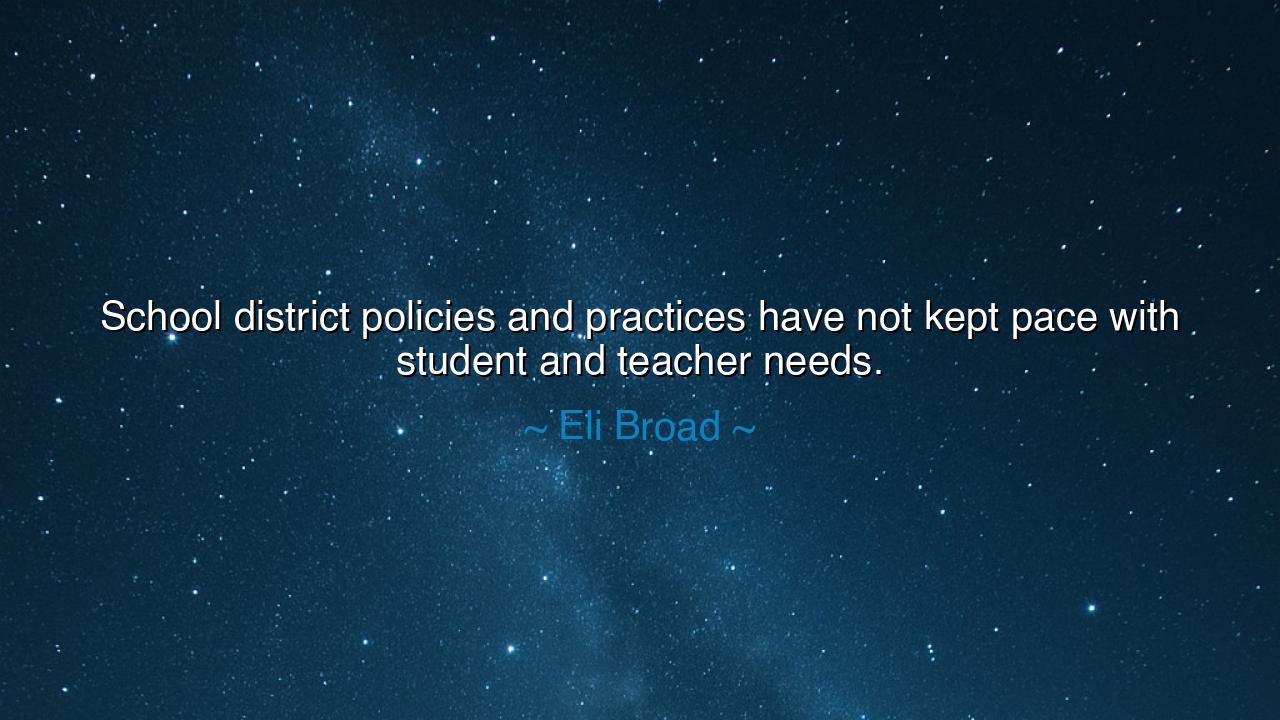
School district policies and practices have not kept pace with
School district policies and practices have not kept pace with student and teacher needs.






The words of Eli Broad—“School district policies and practices have not kept pace with student and teacher needs”—resound like a solemn bell, calling us to awaken from complacency. They remind us that education is not a monument carved in stone, but a living river that must continually flow with the times. When policies remain stagnant while the needs of students and teachers evolve, the great purpose of schooling falters. For the heart of education is not found in rules and bureaucracy, but in the living exchange of wisdom, in the hunger of learners and the devotion of their guides.
The origin of Broad’s insight lies in his lifelong work as a philanthropist and advocate for educational reform. He saw that while the world outside classrooms was transforming—technology rising, economies shifting, cultures blending—schools too often clung to outdated structures. Practices designed for another century, another society, could no longer serve the complex realities of the present. His words call us to recognize this dangerous gap: when institutions fail to change, they cease to nurture, and the very children they are charged to protect are left unprepared for the storms of life.
History offers many echoes of this truth. Consider the plight of industrial-era schooling in the late 19th and early 20th centuries. At that time, schools resembled factories: rigid rows of desks, bells that marked the hours, lessons drilled by rote. Such methods may have served a world that demanded obedient workers for machines, but they strangled creativity and crushed individuality. It was only when reformers like John Dewey arose, advocating for education as a preparation for democratic life and critical thought, that schools began to move closer to the needs of their students. Broad’s warning is born of this same spirit: education must never lag behind life.
The emotional power of his words lies in their recognition of the human cost. When policies are slow, children suffer. A gifted student may languish, unchallenged. A struggling student may sink, unsupported. A teacher, burdened by paperwork and outdated mandates, may lose the spark of inspiration. And in that loss, an entire generation is impoverished. We must remember that behind every statistic lies a face, a dream, a fragile life whose future depends upon the care we give in the present.
There is also something heroic in this teaching. For Broad’s words challenge us not to accept the inertia of institutions. To reform schools requires courage, for bureaucracy resists change, and tradition clings tightly to its forms. Yet true leadership demands that we act boldly, not for the comfort of the present, but for the promise of the future. The heroes of education are not only those who teach, but also those who dare to reshape the structures that either empower or constrain the classroom.
The lesson for us is clear: we must never confuse the means with the ends. Policies are tools, not purposes; practices are methods, not truths. The true aim of education is the flourishing of students and the support of teachers. If the structures we have built no longer serve that aim, then they must be reformed, rebuilt, or replaced. To cling to them is to sacrifice the living for the sake of the dead.
What, then, shall we do? Let us listen to the voices of teachers who labor daily in the classroom, for they know the needs better than distant authorities. Let us listen to the voices of students, whose struggles and aspirations reveal what policies too often ignore. Let us have the courage to innovate, to experiment, to embrace new models of teaching that honor the individuality of every child. And let us remember that reform is not betrayal, but fidelity to the deeper mission of education itself.
Thus, Broad’s words stand as both critique and command: schools must evolve with the needs of their people, or they will fail them. To honor students and teachers is to honor the future. And those who labor for such reform walk in the company of the great educators of history, who dared to see not only what was, but what must be. For in the end, the truest policy is love, and the greatest practice is the pursuit of wisdom made alive for every generation.






AAdministratorAdministrator
Welcome, honored guests. Please leave a comment, we will respond soon